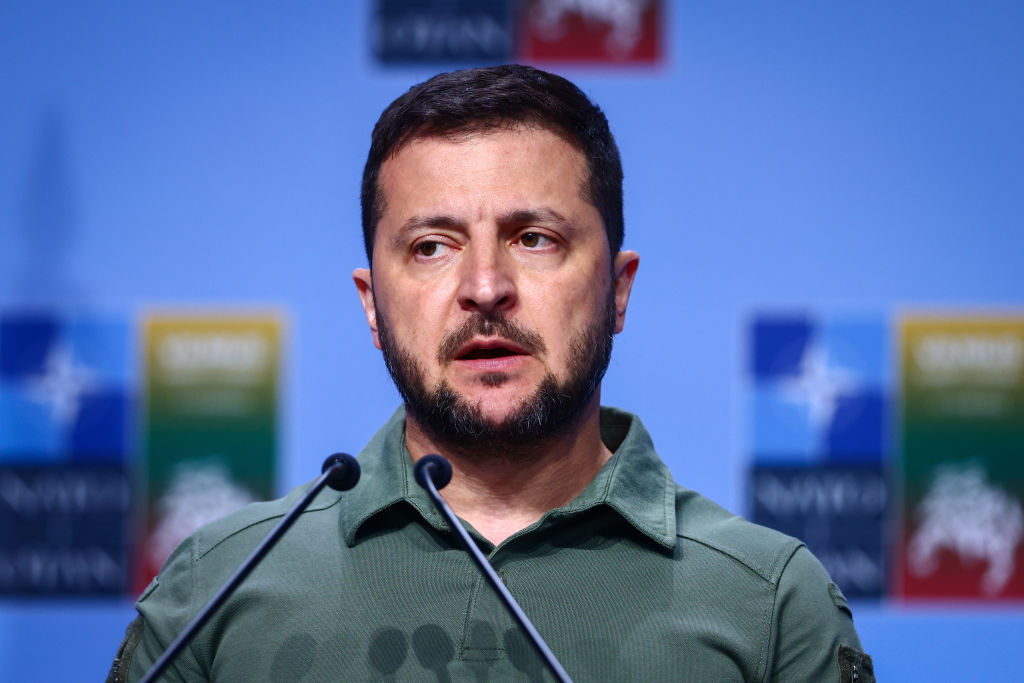Various media reports originating in Ukraine and Russia are claiming that the Ukrainian government is seeking to extradite military-aged refugees and “draft dodgers” back to the country, and that Ukraine’s requests have so far been rejected by a number of its European neighbors. The reports, which are being circulated primarily by Russian government-funded media organizations RT and Sputnik, have also spread to some Western media including a viral Facebook video.
“Ukraine has, of course, run out of men to fight NATO’s war, and they’re calling on Europe to send the draft dodgers back home to fight,” one of the Facebook video’s two unidentified presenters says. The video, citing a viral TikTok clip, also claims that a number of European countries have been sending extradition letters to refugees on behalf of the Ukrainian government.
While there has been some discussion of extradition procedures by Ukrainian officials, claims that Ukraine intends to repatriate refugees to fight in the current conflict are unfounded—and they may even be part of an organized Russian disinformation effort.
“This is obviously a coordinated campaign,” Dr. Sarah Oates, a professor at the University of Maryland and expert on Russian disinformation and propaganda tells The Dispatch Fact Check. “[Russian strategists] probably sat down here and brainstormed some ways to undermine Ukrainian morale and support for Ukraine internationally.”
According to Oates, Russian disinformation typically has a number of identifiable markers if you look closely enough. For example, while Russian disinformation is occasionally constructed from false materials, more often than not it leverages legitimate facts, statistics, and statements, often by decontextualizing or misrepresenting them to push a specific narrative. “That’s why Russian propaganda is difficult for fact checkers,” Oates explains. “Unless you’re a savvy reader, you’re often not going to notice.”
The articles by RT and Sputnik both misrepresent a number of true statements and events. Sputnik, for example, accurately reports that Ukraine’s National Security and Defence Council recently ordered an inspection of conscription exemptions made on medical grounds due to evidence that some had been fraudulent. However, the article uses this fact to bolster a claim that Ukrainian law enforcement agencies have been instructed to request the extradition of “draft dodgers” so that they can be prosecuted—an assertion that lacks evidence. It also omits a number of key facts that conflict with its narrative, including a statement made by Fedir Venislavsky, a representative of the president in the Ukrainian parliament, denying that the government has any capacity or intention to pursue mass extraditions.
RT similarly reports that Poland has already begun to extradite some Ukrainian men. This statement is based on accurate reporting by the Polish publication Rzeczpospolita. However, the original article is clear that Polish authorities have enforced arrest warrants only on individuals who illegally transported Ukrainian citizens into the EU, not on Ukrainian refugees more broadly.
Both RT and Sputnik also claim that countries like the Czech Republic have rejected Ukraine’s requests for extradition, but evidence suggests that no such requests have been made. The stories cite a statement made by Vladimír Řepka, a spokesperson for the Czech Ministry of Justice, and accurately reports his assertion that military offenses—including evasion of mobilization—are exempt from the European Convention on Extradition. However, it fails to note that the Czech Ministry of Justice has not actually received any extradition requests from Ukraine. “The Ukrainian authorities have never addressed the Ministry of Justice in this matter,” Řepka tells The Dispatch Fact Check.
RT and Sputnik have long been at the forefront of Russia’s coordinated communications strategy, and the two are central components of the country’s disinformation and propaganda ecosystem. “Russian strategic communication is very sophisticated; it’s clever, it’s coordinated, and it has a good understanding of its audiences,” Oates explains. “It isn’t easy to write—it is an art—and I think that RT in particular is very good at it.”
Traditional media is not the only format through which disinformation spreads. The messaging app Telegram, which has a substantial user base in Ukraine and Russia, is another common vehicle. “Russian Telegram channels pretending to be Ukrainian Telegram channels are also spreading claims that Ukrainian officials are now going to ‘hunt down’ middle class citizens that bribed their way out of mobilization,” Kateryna Stepanenko, a Russia expert at the Institute for the Study of War, tells The Dispatch Fact Check.
The Russian government also leverages other more traditional social media platforms to diffuse state narratives into the information environment. It once even paid influencers on the Chinese video platform TikTok to push pro-Kremlin narratives. Earlier this year, a number of Ukrainian refugees in the United Kingdom and Lithuania received fraudulent extradition letters, and videos of the affair made their way prominently onto TikTok. It is unlikely that these letters are linked directly with the current extradition narrative given their initial emergence over six months ago, but their continued recirculation is possibly adding more fuel to the disinformation fire.
Russian media propaganda also plays off of existing fears and anxieties. “It takes what we already worry about and twists the knife,” Oates explains. In the case of claims surrounding Ukrainian extraditions, Russia is likely seeking to drive anxiety and mistrust among Ukrainian refugees abroad. “Russian sources have routinely used mobilization issues in Ukraine to stir panic among Ukrainian citizens in Ukraine and abroad, weaken the Ukrainian morale, and spark tensions in Ukrainian societies against the government,” Stepanenko explains.
Beyond the post-Soviet bloc, Russia also tries to pick away support for Ukraine among the U.S. and its allies. “[Russia’s] target is the American Congress and the American president,” Oates says. “As long as America and Europe keep funding the war in Ukraine, that’s very problematic for Russia.” While the extradition narrative itself has seen relatively little mainstream attention outside of Ukraine and its neighbors, other efforts have had far greater impacts. In early 2022, a viral conspiracy concerning U.S. bioweapons in Ukraine quickly evolved from a fringe theory circulating in far-right social media to a central Kremlin talking point, eventually being forwarded by a number of public figures with major audiences including Tucker Carlson and Donald Trump Jr.
“Russia under Putin has traditionally had four main messages they want to get across,” Oates says. “They want you to believe that Russia is a resurgent and great nation, that Russia will protect Russians no matter where they live in the world, that democracy is flawed and failing, and that the West—and NATO and America in particular—is out to get Russia.” However, in Oates’ opinion, it is the message that Ukraine and NATO are somehow at fault for the current conflict that has infected America the most. “That is the narrative that I think has found the most traction in the United States,” Oates explains, “and I find that breathtakingly wrong.”
If you have a claim you would like to see us fact check, please send us an email at factcheck@thedispatch.com. If you would like to suggest a correction to this piece or any other Dispatch article, please email corrections@thedispatch.com.







Please note that we at The Dispatch hold ourselves, our work, and our commenters to a higher standard than other places on the internet. We welcome comments that foster genuine debate or discussion—including comments critical of us or our work—but responses that include ad hominem attacks on fellow Dispatch members or are intended to stoke fear and anger may be moderated.
With your membership, you only have the ability to comment on The Morning Dispatch articles. Consider upgrading to join the conversation everywhere.